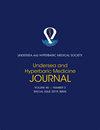憋气潜水员动脉气体栓塞。
IF 0.7
4区 医学
Q4 MARINE & FRESHWATER BIOLOGY
Undersea and Hyperbaric Medicine
Pub Date : 2024-01-01
引用次数: 0
摘要
动脉气体栓塞(AGE)是水肺潜水的一种潜在致命并发症,与上升过程中呼气不足有关。在憋气潜水期间,动脉气体栓塞的可能性不大,因为肺中的气体量一般不会超过潜水开始时的气体量。但是,如果潜水员在潜水过程中的任何时候从气源吸入气体,就有可能发生 AGE 或其他肺过度充气综合症 (POIS)。在本病例报告中,一名憋气潜水员在约 40 英尺处从气囊中呼吸后,在没有呼气的情况下迅速上升,疑似发生 AGE。本文章由计算机程序翻译,如有差异,请以英文原文为准。
Arterial Gas Embolism in Breath-Hold Diver.
An arterial gas embolism (AGE) is a potentially fatal complication of scuba diving that is related to insufficient exhalation during ascent. During breath-hold diving, an arterial gas embolism is unlikely because the volume of gas in the lungs generally cannot exceed the volume at the beginning of the dive. However, if a diver breathes from a gas source at any time during the dive, they are at risk for an AGE or other pulmonary overinflation syndromes (POIS). In this case report, a breath-hold diver suffered a suspected AGE due to rapidly ascending without exhalation following breathing from an air pocket at approximately 40 feet.
求助全文
通过发布文献求助,成功后即可免费获取论文全文。
去求助
来源期刊

Undersea and Hyperbaric Medicine
医学-海洋与淡水生物学
CiteScore
1.60
自引率
11.10%
发文量
37
审稿时长
>12 weeks
期刊介绍:
Undersea and Hyperbaric Medicine Journal accepts manuscripts for publication that are related to the areas of diving
research and physiology, hyperbaric medicine and oxygen therapy, submarine medicine, naval medicine and clinical research
related to the above topics. To be considered for UHM scientific papers must deal with significant and new research in an
area related to biological, physical and clinical phenomena related to the above environments.
 求助内容:
求助内容: 应助结果提醒方式:
应助结果提醒方式:


